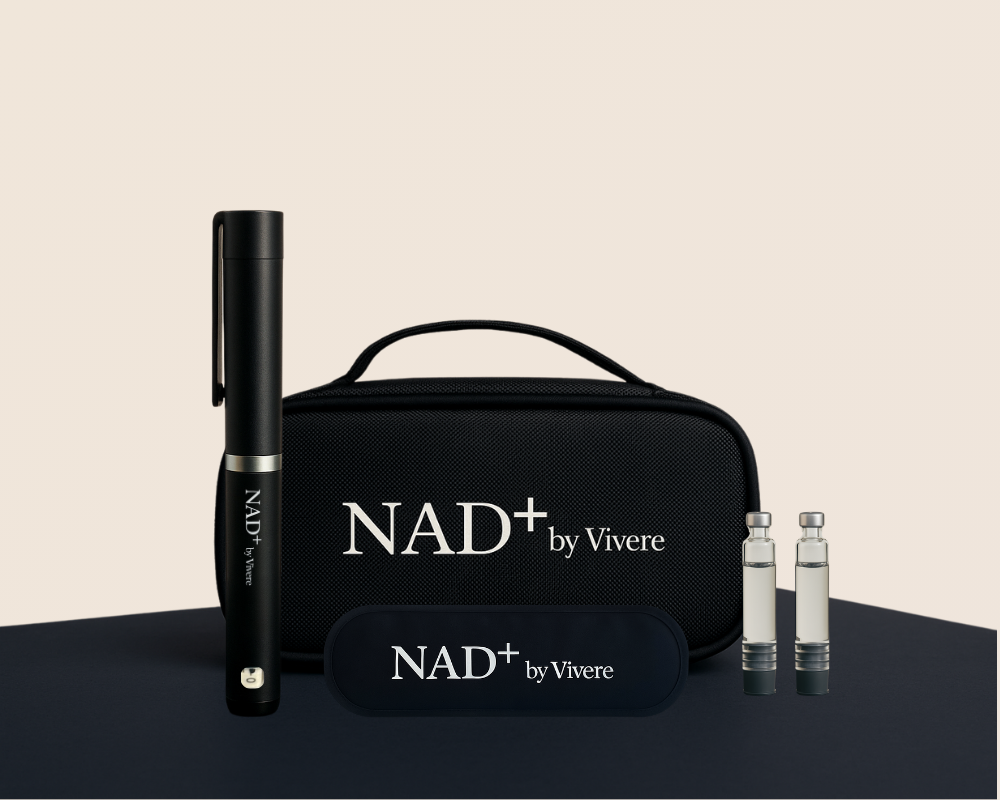Which Celebrities Have Taken NAD+ (and Why)?
Last Updated: 02 January 2026

The pursuit of longevity and vitality has become a global movement. From high-profile actors to world-class athletes, many public figures have turned their attention to NAD+, a naturally occurring molecule believed to support energy, repair and healthy ageing. In this guide, we look at the famous names connected to NAD+, why they say they use it, and the evidence behind the headlines.
The insights provided in this article are from Vivere’s Head of Nutrition, Yusra Serdaroglu Aydin, a registered dietitian with a background in nutrition, food engineering and culinary arts. Her approach is grounded in science and shaped by a strong understanding of personalised nutrition and the human microbiome.
Key Takeaways
Here are the five biggest takeaways from this article about which celebrities have taken NAD+ and why:
NAD+ is a vital molecule that helps the body produce energy, repair cells and support healthy ageing.
Supplements (including injections) are used to raise NAD+ levels.
Celebrities including Jennifer Aniston, Hailey Bieber, Joe Rogan and Gwyneth Paltrow have reportedly used NAD+.
NAD+ therapy should only be considered under professional guidance, especially when delivered through IV infusions, which requires professional help.
What is NAD+ in simple terms?
NAD+ (nicotinamide adenine dinucleotide) is a molecule found in every cell of the human body. It plays a vital role in energy production, DNA repair and cellular communication. Without enough NAD+, our cells can struggle to convert nutrients into energy, repair damage or function efficiently [1].
If you’re new to NAD+, learn more about NAD+ in our beginner’s guide.
As we age, NAD+ levels naturally decline, which is a normal part of the ageing process. This reduction can be linked with reduced energy, slower metabolism, increased oxidative stress and a greater risk of age-related diseases. Researchers believe that maintaining or restoring NAD+ levels could help support cellular health and potentially slow aspects of the ageing process [2].
NR and NMN: the common “NAD+ supplements”
Two of the most widely discussed NAD+ precursors are nicotinamide riboside (NR) and nicotinamide mononucleotide (NMN). NR and NMN boost NAD+ production.
Studies suggest that NR and NMN can effectively increase NAD+ when taken in capsule or powder form [3] [4] [5]. NR, in particular, has been shown to safely elevate NAD+ in humans, which is why it features in many supplements.
Which celebrities have taken NAD+?
Below are the most cited examples and what they have said on the record.
Hailey Bieber and Kendall Jenner
The duo appeared on The Kardashians, receiving NAD+ IV therapy. Hailey said on camera, “I’m going to NAD for the rest of my life, and I’m never going to age.” Whilst this statement is hyperbolic, as no one can actually prevent getting older, it helped push the treatment into the mainstream and got a lot of people interested in the potential benefits for reducing the visual signs of ageing.
Jennifer Aniston
Jennifer Aniston is another well-known figure who has embraced NAD+ therapy. As featured in the Wall Street Journal, the actress has praised weekly NAD+ “peptide” shots and called them “the future” [6].
Joe Rogan
Podcast host and fitness enthusiast Joe Rogan has openly discussed his use of NAD+ injections. He claims they support his energy levels, recovery and mental clarity, especially during periods of heavy training or podcast production.
Gwyneth Paltrow
Wellness entrepreneur and actress Gwyneth Paltrow has said she gets NAD+ IV drips every few months as a “beauty from the inside out” treatment and has mentioned using IVs around long COVID recovery. These comments appeared in a Harper’s Bazaar interview reported by multiple outlets.
Justin Bieber
Justin Bieber showed an NAD+ IV as part of his wellness routine in his documentary series Seasons, bringing further attention to the trend.
It’s important to note that mentions of celebrity use are not a medical endorsement. They show interest and access, not proof of effectiveness.
Why are celebrities taking NAD+?
While each celebrity may have their reasons, there are common themes behind the trend — all linked to performance, appearance and longevity.
Energy and recovery
NAD+ plays a key role in converting food into energy at a cellular level. Higher NAD+ levels may support better mitochondrial function, which can improve energy production and recovery after physical or mental stress. For athletes or performers, this could mean faster recovery and more consistent performance.
Longevity and beauty
The association between NAD+ and anti-ageing has made it particularly appealing in the beauty world. Research has linked declining NAD+ levels to cellular ageing, which can influence skin health, elasticity and appearance.
Immune, stress and travel support
Frequent travel, high stress and exposure to different environments can affect immune health and energy balance. NAD+ is thought to support resilience by helping cells repair damage and regulate inflammation. This makes it an attractive option for people whose lifestyles involve demanding schedules and constant travel.
How do they take it?
IV infusions and injections
Intravenous (IV) NAD+ infusions are the most direct method of raising NAD+ levels. The treatment delivers NAD+ directly into the bloodstream, bypassing digestion for faster absorption. Sessions can last several hours, during which NAD+ is slowly infused to minimise discomfort. Always use reputable, medically led providers. NAD+ infusion therapy should only be considered under professional guidance.
Injections are another method, typically given subcutaneously. One popular NAD+ product is Vivere’s NAD+ injection pen.
If you’re considering NAD+ injections our beginner’s guide is a great starting point to learn more about the at-home form of NAD therapy.
Oral precursors: NR and NMN
For those who prefer an oral approach, NR and NMN supplements offer a convenient alternative. When taken daily, they can gradually support NAD+ production, helping maintain energy, focus and cellular health without the need for infusions.

What does the science actually say?
Raising NAD+ is possible in humans
Research confirms that NAD+ levels can be raised through oral supplementation or IV therapy. This means it is scientifically possible to influence cellular NAD+ availability using supplementation.
Clinical outcomes remain uncertain
While raising NAD+ is achievable, clinical outcomes are still being studied. There is early evidence suggesting benefits for metabolic health, cognitive function and muscle repair, but more research is needed to confirm these effects in long-term human trials.
Ageing and NAD+
Declining NAD+ is a recognised feature of ageing, with links to reduced mitochondrial function and DNA repair [2]. Restoring NAD+ may help cells operate more efficiently, but it is not a cure for ageing. Instead, it supports the biological processes that help the body maintain resilience over time.
Safety, risks and good practice
Short term safety of NR and similar precursors looks acceptable in studies, with typical supplement-like side effects. IV NAD+ data are more limited, so medical oversight matters.
Do not use unregulated kits without appropriate guidance. Infusions should be set up and monitored by qualified professionals.
If you are pregnant or breastfeeding, or have specific medical concerns such as kidney or liver problems, or take regular medicines, get advice from a clinician who understands your history before trying NAD+ products or drips.
Lifestyle first. Sleep, exercise, diet and stress control remain the strongest, proven ways to support energy and healthy ageing.
FAQs
Is NAD+ the same as NR or NMN?
No. NAD+ is the molecule your cells use. NR and NMN are building blocks your body can convert into NAD+
Is there proof that NAD+ stops ageing?
There is no evidence that NAD+ can stop ageing. However, studies suggest it supports key cellular processes that may slow some age-related changes.
Which is better, injections, IVs or capsules?
IV gives an immediate high bloodstream level under supervision. Capsules are easier to use and have human data showing rises in NAD+ markers. Injections are easy to use and provide excellent results. There is no clear “best” for outcomes. Speak to a clinician about your goals and health.
Nutritionist’s Corner: Final Thoughts
NAD+ has become a celebrity favourite because it fits a simple story: our cells run on NAD+, levels may drop with age, and topping them up might help us feel and perform better. The reality is more nuanced. Famous faces can draw attention to a trend, but their routines are not medical guidance, and the strongest human evidence so far is that certain supplements can raise NAD+ levels, not that they reverse ageing.
If you are curious, start with the basics that are proven to support healthy ageing, then discuss any NAD+ products or IVs with a qualified professional who can weigh up your personal goals. Celebrities can inspire, but your plan should be based on sound evidence and your own health needs.
"NAD+ sits at the intersection of wellness for many celebrities, increasing interest in the treatment and offering a compelling narrative around energy, repair and healthy ageing. While famous names have helped bring attention to its potential, the real takeaway is more grounded: NAD+ levels can be supported, but meaningful benefits depend on evidence, professional guidance and a lifestyle that prioritises the fundamentals long before the headlines".
Vivere helps you take control of your health with personalised insights from state-of-the-art gut microbiome testing, nutritional guidance, science-backed supplements, NAD+ injections and expert support. Sign up today and start living better, for longer.
Sources
[1] Why NAD+ Declines during Aging: It’s Destroyed - Cell Metabolism
[2] Age-related NAD+ decline - ScienceDirect
[5] Nicotinamide riboside is uniquely and orally bioavailable in mice and humans - Nature Communications
[6] How Jennifer Aniston Went From Sitcom Star to Hollywood Power Player - Wall Street Journal
Author

Yusra Serdaroglu Aydin, MSc RD
Head of Nutrition and Registered Dietitian
Yusra is a registered dietitian with a multidisciplinary background in nutrition, food engineering, and culinary arts. During her education, her curio...
Peer Reviewed by

Emily Stuart, RD
Dietitian
Emily is a Registered Dietitian, health writer, and professional chef with a unique blend of clinical, culinary, and communication expertise. She has...